No stone unturned: new approaches to how agriculture and land-use sectors can strengthen climate action for food security
FAO and CIFOR-ICRAF launch a joint publication on land use in the context of ongoing UNFCCC processes

The new publication takes a fresh look at the complex interactions between different land uses, their dynamics and potential contributions to climate action. This more holistic view of land use also considers how agriculture interacts with other land uses in the context of the Sharm el-Sheikh decision and other relevant processes under the United Nations Convention on Climate Change (UNFCCC).
Jointly published by FAO and the Center for International Forestry Research (CIFOR), lead center for the CGIAR research programme on Forests, Trees and Agroforestry, “Land use and the Sharm-el-Sheikh joint work on implementation of climate action on agriculture and food security” presents findings that support policy and decision makers to adopt and promote a more integrated approach to climate action and sustainable development in the land-use sectors. The publication serves as a tool in the formulation and implementation of countries’ national strategies and commitments such as the nationally determined contributions -NDCs, National Adaptation Plans-NAPs, National Biodiversity Strategies and Action Plans -NBSAPs and land degradation neutrality targets.
Land-use sectors and climate change
Land-use sectors are among the most vulnerable to climate change and are increasingly affected by its impacts. These impacts threaten agricultural and land productivity, the resilience of ecosystems, and our collective capacity for climate change adaptation and mitigation.
Agriculture, forestry and other land use sectors are the second source of greenhouse gas emissions after fossil fuel use, accounting for 24 percent of global emissions.
At the same time, our agrifood systems can provide sustainable, impactful solutions to the climate crisis.
The 2022 UN Climate Conference in Egypt (COP27) adopted the Decision on the ‘Sharm el-Sheikh joint work on implementation of climate action on agriculture and food security’, an opportunity to better address agriculture-related issues in the global climate negotiations, recognizing the priority of safeguarding food security and ending hunger, the limited resilience of global food systems to climate change and the important role of our ‘stewards of the land’ – farmers.
Proposals to ensure better consideration of land use under the UNFCCC
The new publication presents a series of proposals on how agriculture and land-use issues could further be considered under the UNFCCC. These proposals are grouped under five broad topics:
- Adoption of a more integrated approach to the sustainable management of natural resources.
- Consideration of the potential consequences of broad changes in land use induced by climate change and by the policies to address it.
- Implementation of existing technologies and approaches in land use, including the contribution of trees and agroforestry and the potential of landscape restoration as a climate action.
- Understanding how the land-use sectors could be better integrated in the work of various bodies under the Convention.
- Transparent and coordinated participation of all relevant stakeholders.
FAO’s ongoing support in the global climate arena
The publication builds on FAO’s long-lasting support to its Members, agriculture experts under the UNFCCC, COP Presidencies and policymakers.
In 2023, FAO and the World Bank, in collaboration with the COP28 Presidency, CGIAR and the International Fund for Agricultural Development (IFAD), supported agricultural experts ahead of discussions under the Sharm el-Sheikh Decision before COP28 in Dubai.
As we mark the halfway point to COP29 at this week’s Bonn Climate Conference, FAO is committed to supporting the development and implementation of the four-year Sharm el-Sheikh Decision, building on previous achievements from the Koronivia Joint Work on Agriculture (KJWA) process and providing countries with technical support, expert knowledge and capacity strengthening to adapt to and mitigate climate change.
FAO is advocating to better integrate environmental challenges to food security and nutrition in the global arena, especially through the three Rio Conventions (Climate, Biodiversity and Combating Desertification).
We continue to work towards a global consensus on the role of agriculture, food, and land, as a powerful solution to the climate crisis. Agrifood system solutions are climate and biodiversity solutions.
Read more
 |
